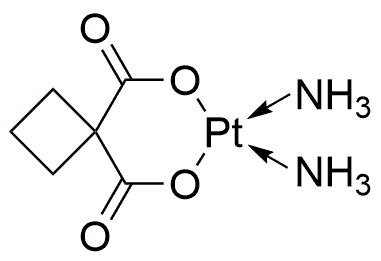Carboplatin is widely utilized in research focused on
- Cancer Treatment: Primarily used as a chemotherapy drug for treating various cancers, including ovarian and testicular cancer, offering an alternative to cisplatin with reduced side effects.
- Pharmaceutical Development: Employed in the development of new cancer therapies, researchers study its mechanisms to enhance efficacy and minimize toxicity in patients.
- Combination Therapies: Often used in combination with other drugs to improve treatment outcomes, researchers explore synergistic effects that can lead to more effective cancer regimens.
- Clinical Trials: Frequently a subject of clinical trials aimed at understanding its long-term effects and potential in treating other malignancies, providing valuable data for oncologists.
- Research on Resistance Mechanisms: Investigated for its role in developing drug resistance in cancer cells, helping scientists to devise strategies to overcome this challenge in treatment.
Información general
Propiedades
Seguridad y normativas
Aplicaciones
Carboplatin is widely utilized in research focused on
- Cancer Treatment: Primarily used as a chemotherapy drug for treating various cancers, including ovarian and testicular cancer, offering an alternative to cisplatin with reduced side effects.
- Pharmaceutical Development: Employed in the development of new cancer therapies, researchers study its mechanisms to enhance efficacy and minimize toxicity in patients.
- Combination Therapies: Often used in combination with other drugs to improve treatment outcomes, researchers explore synergistic effects that can lead to more effective cancer regimens.
- Clinical Trials: Frequently a subject of clinical trials aimed at understanding its long-term effects and potential in treating other malignancies, providing valuable data for oncologists.
- Research on Resistance Mechanisms: Investigated for its role in developing drug resistance in cancer cells, helping scientists to devise strategies to overcome this challenge in treatment.
Documentos
Hojas de datos de seguridad (HDS)
La SDS proporciona información de seguridad completa sobre la manipulación, el almacenamiento y la eliminación del producto.
Especificación del producto (PS)
La PS proporciona un desglose completo de las propiedades del producto, incluida la composición química, el estado físico, la pureza y los requisitos de almacenamiento. También detalla los rangos de calidad aceptables y las aplicaciones previstas del producto.
Certificados de análisis (COA)
Busque certificados de análisis (COA) ingresando el número de lote del producto. Los números de lote y de partida se pueden encontrar en la etiqueta de un producto después de las palabras "Lote" o "Lote".
Número de catálogo
Número de lote/lote
Certificados de origen (COO)
Este certificado de origen confirma el país en el que se fabricó el producto y también detalla los materiales y componentes utilizados en él y si se deriva de fuentes naturales, sintéticas u otras fuentes específicas. Este certificado puede ser necesario para cumplir con las normativas aduaneras, comerciales y regulatorias.
Número de catálogo
Número de lote/lote
Hojas de datos de seguridad (HDS)
La SDS proporciona información de seguridad completa sobre la manipulación, el almacenamiento y la eliminación del producto.
DownloadEspecificación del producto (PS)
La PS proporciona un desglose completo de las propiedades del producto, incluida la composición química, el estado físico, la pureza y los requisitos de almacenamiento. También detalla los rangos de calidad aceptables y las aplicaciones previstas del producto.
DownloadCertificados de análisis (COA)
Busque certificados de análisis (COA) ingresando el número de lote del producto. Los números de lote y de partida se pueden encontrar en la etiqueta de un producto después de las palabras "Lote" o "Lote".
Número de catálogo
Número de lote/lote
Certificados de origen (COO)
Este certificado de origen confirma el país en el que se fabricó el producto y también detalla los materiales y componentes utilizados en él y si se deriva de fuentes naturales, sintéticas u otras fuentes específicas. Este certificado puede ser necesario para cumplir con las normativas aduaneras, comerciales y regulatorias.


